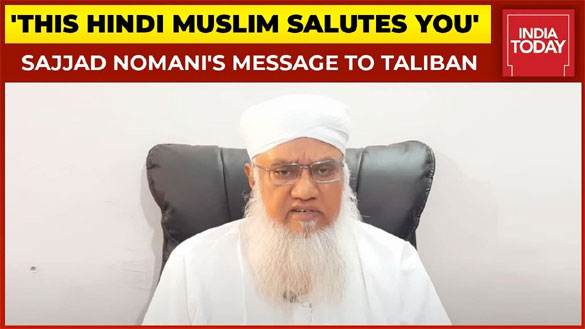After the disastrous interview of AIMPLB’s Sajjad Nomani, who welcomed the victory of the Taliban in Afghanistan and sent out greetings on behalf of Indian Muslims, there have been no further such messages from any of the Ulama organizations. Should we think that this is so because the wider Indian Ulama did not like what Sajjad Nomani had to say or because they are ideologically opposed to the Taliban? Certainly, the Barelwis have opposed the Deobandis in every matter of faith but one is yet to see any Barelwi body issuing a statement against the Taliban. This was expected, given the context that the Taliban have been ideologically against shrine-centric religiosity in Islam. Moreover, after sections of the media and the government called out Sajjad Nomani, other Deobandis did not come out in his defence. Even the AIMPLB distanced itself from his statement and made sure not to comment on what Nomani spoke. How should we understand this silence?
Partly, this is strategic. In the context of the upcoming Uttar Pradesh elections and the high-handedness with which the government is going against anyone who is speaking even slightly in favour of the Taliban, the Ulama have chosen to remain silent. Their silence, therefore, should not be construed as not having a position on Taliban but only that under the current political regime, they deem it imprudent to voice their opinions. Truth be told: there is wide sympathy for the Taliban among the Indian Ulama cutting across denominational rivalries. The Deobandis and the Barelwis can fight ad hominem on inane issues like the second azan on Jumma, but they do not dispute each other on the necessity of proclaiming the sharia or its implementation through an Islamic state.
The Deobandis proclaim themselves as followers of composite nationalism and plume themselves as being part of the freedom movement. Certainly, a faction led by Husain Ahmad Madani was with the Congress party and fought for India’s freedom. However, even Husain Ahmad did not abjure the necessity of an Islamic state for Muslims as his belief in composite nationalism was only for a ‘limited time’: till the time all Indians do not become Muslims. He was a firm believer that eventually everyone living in India would become Muslims and there would be no need of a composite nationalism after that. In this utopia, the Muslim life would be organized within an Islamic state. There was another faction within Deoband led by Shabbir Ahmad and Ashraf Ali Thanwi who were firm believers in the idea of Pakistan, for only within an Islamic state could sharia be implemented. So Deoband is not very different from the Taliban when it comes to the idea of establishing an Islamic state after all.

The Barelwis have declared themselves as the arch-rivals of the Deobandis. Their ideologue Ahmad Raza Khan issued of kufr against leading Deobandi scholars and by extension against anyone who is associated with Deoband. Does it mean that they will be against the Taliban? Ahmad Raza, when he was alive, had predicted the end of the British rule which was to be followed by Muslim rule. He had some kind of a shadow cabinet ready and had even thought of names for some important state positions. But this again was an Islamic state and Muslims were to be governed according to the rules of the sharia. Ahmad Raza died before he could realize this dream but, ultimately, leading Sufis and Barelwi landlords ended up supporting Pakistan because of their belief in establishing an Islamic state. So how does this make the Barelwis any different from the Taliban?
But this fascination for the sharia is not just limited to the Ulama. Through many years and various mediums, it has now been percolated down to the Muslim masses and has nearly become part of their common sense. Else, how do we understand that 74% Indian Muslims expressed their desire for sharia courts in the recent PEW survey? That explains why after the Taliban took over Afghanistan, social media pages were disturbingly full of appreciative messages from Indian Muslims.
Muslims have been living in independent India for more than seven decades now. It appears as if the institutions of democracy, secular principles and normative equality of gender have had no effect on them. Why else, after living for so many decades in a ‘nominal’ secular state, would we still pine for a system like the sharia which is blatantly discriminatory towards women and the minorities? This can only mean that Indian Muslims do not see themselves as part of a collective national life. Or that, when they speak of the Constitution, they are only concerned about safeguarding their own conservative interests. There is no other reason why Indian Muslims, who are fortunate to live in a democracy (unlike most Muslims across the world), would not condemn the Taliban and its medieval vision unequivocally.
This is not to suggest that such voices are completely absent. The statements of Indian Muslims for Secular Democracy (IMSD) and Bhartiya Muslim Mahila Andolan (BMMA), condemning the Taliban, are laudatory but then why are mainstream political and religious leaders silent? It is very heartening to note that low caste Muslim groups have out rightly condemned the Taliban for its regressive mindset and have expressed their faith in democracy and pluralism. But their contention that only Ashraf Muslims are fascinated by the Taliban is not true. This movement would do well to realize that Pasmanda Muslims would be an overwhelming part of the 74% Indian Muslims pining for sharia. They need to move beyond rhetoric and stop the increasing Islamization of their society; else, they might win the battle one day but will ultimately lose the war.
Source URL: Radical Islamism



